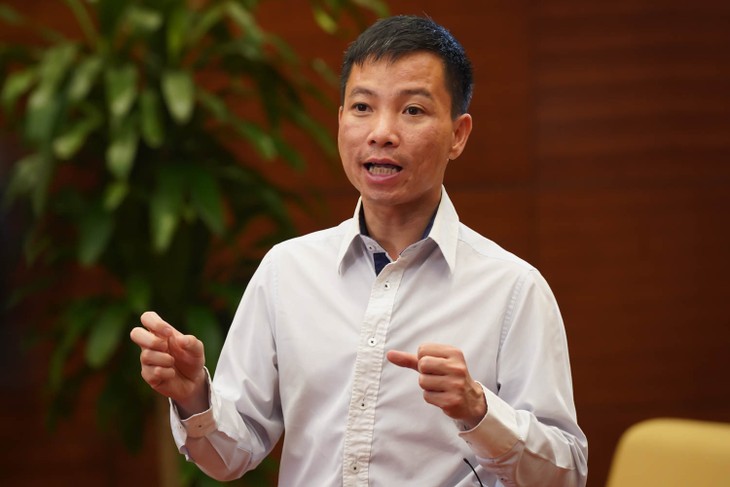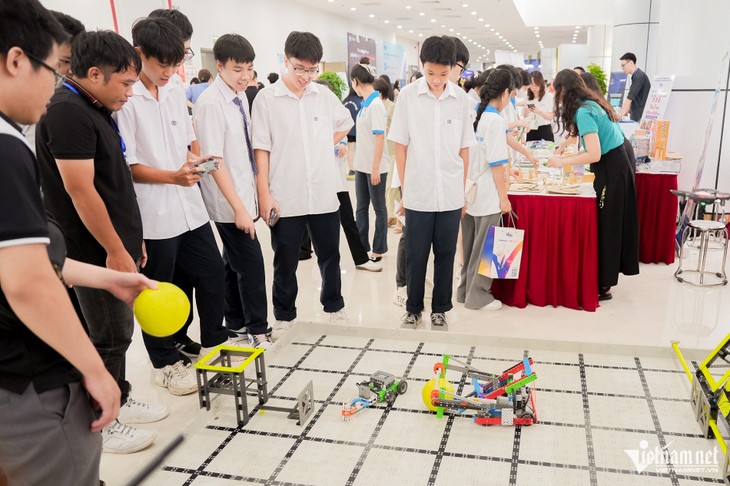(VOVWORLD) - Vietnam should focus on innovation, a new direction like combining AI with chip design rather than chasing models by early adopters, Dr. Le Viet Quoc, a leading AI scientist at Google Brain, told media on the sidelines of the recent International Conference on AI and Semiconductors in Hanoi. Quoc, who is also a founding engineer at Google DeepMind, gave an insight on the current trends of AI, particularly AI agents, Vietnam's conditions, and his recommendations for Vietnam’s AI development.
 Dr. Le Viet Quoc, a Vietnamese AI scientist working at Google (Photo: LQ) Dr. Le Viet Quoc, a Vietnamese AI scientist working at Google (Photo: LQ) |
Bao Tram: With the current rapid development of AI, what are your predictions for its future?
Viet Quoc: AI technology is advancing rapidly and AI agents will be the next major breakthrough. Between 2022 and 2025, chatbots dominated AI development. Over the next two to three years, AI agents will take center stage. Unlike chatbots, AI agents will actively assist users by researching information online and engaging with individuals. This shift will lead to more practical applications. Many companies are already investing in AI agents, and I believe we’ll see major breakthroughs this year.
But the biggest challenge in developing AI agents is data availability. Early chatbots were trained using large internet datasets to predict the next word in a sentence. More recently, reasoning-based AI models have emerged, relying on vast amounts of data to verify accuracy.
But AI agents require real-world interaction data, which is scarce. These systems will need to conduct experiments and interact with the physical world to generate meaningful responses. This is a major challenge.
Bao Tram: What do you think of the possibility of AI agents replacing human workers and will this happen in Vietnam?
Viet Quoc: In the long term, I can say that AI agents will surely affect, even replace workers. Top affected people will be programmers. Now the tools used for programming are supported with AI agents which are changing the way programmers work around the world, even in large companies in the US. Vietnam does a lot of outsourcing. Although I haven’t got specific figures, I think in the next few years, this can have a significant impact on this field.
In the longer term, jobs related to working on computers will be better done by AI agents. This includes making presentation slides, drafting documents or word processing, and work that is required to support freelancers.
Further, AI agents can affect physical work, manual work. But this will require greater use of robots. That means it’ll take a longer time.
 Vietnamese young people praised for being good at STEM subjects are a resource and an advantage of Vietnam in AI development. (Photo: TD) Vietnamese young people praised for being good at STEM subjects are a resource and an advantage of Vietnam in AI development. (Photo: TD) |
Bao Tram: Vietnam is said to have great potential in AI development. Some experts say this is a once-in-a-lifetime opportunity, or even a once-in-4000-years opportunity, for Vietnam to participate in advanced technology. What do you think?
Viet Quoc:I agree. It’s not too early, but not too late. It’s too late for Vietnam to get involved in making phones. That technology has been done for a long time. AI and chip technologies are still new. Even the technologies to manufacture chips have been around for a certain amount of time. AI is a very new field so there’s still a lot of potential for Vietnam, which has a big advantage in human capital. So Vietnam should improve its higher education and postgraduate programs. Research institutions in Vietnam should provide an environment where top talents can thrive. Vietnam has a solid STEM education foundation, but more investment is needed. In Asia, Vietnam’s closest competitor in this field is India. If Vietnam leverages its strengths and invests in talent, it has a strong chance of becoming a major AI player.
Bao Tram: What policy recommendations do you have for Vietnam’s AI development?
Viet Quoc: Semiconductor manufacturing requires a huge investment, lots of resources, billions of dollars’ worth. Taiwan Semiconductor Manufacturing Company (TSMC) is many generations ahead of Vietnam in chip manufacturing. Now whatever we do is just chasing them. If Vietnam chooses low-cost manufacturing, we must compete with many countries, particularly China. This would be very difficult. It would be better to invest in AI, because that requires fewer resources and the technology, being new, has a long way to go. That means Vietnam has the possibility of catching up and taking the lead.
But if Vietnam still wants to manufacture chips, I think we should do more chip design instead of chip manufacturing, like the Nvidia model. We should do more design because the margin is bigger. It’s better matched to Vietnam and its resources and capabilities.
Bao Tram: What should Vietnam focus on to develop AI?
Viet Quoc:First, Vietnam should not rush to catch up. If it wants to succeed, Vietnam should focus on innovation. In other words, Vietnam must focus on a new direction, like combining AI with chip design. That’s a promising new direction related to both semiconductors and chip design.
Even DeepSeek is still trying to catch up with major US firms due to resource limitations. To succeed, Vietnam must prioritize innovation. DeepSeek made an impact because of its unique approach, not by simply replicating others.
If Vietnam wants to develop foundational AI models like those powering today’s chatbots, it must focus on areas where it has strengths and room for innovation. Every AI model has weaknesses. If Vietnam can identify and improve upon these, it could surpass its competitors.
Bao Tram: Thank you, Dr. Le Viet Quoc, a founding engineer at Google DeepMind, for granting us this interview.